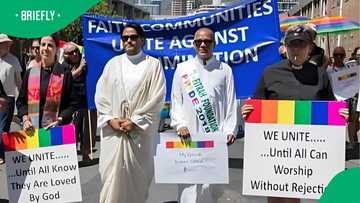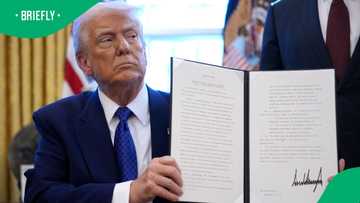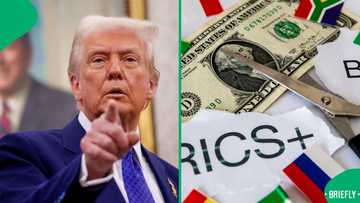Political Analyst Explores Raucous US-SA Relations Over Land Question: “Trump Has Been Influenced”
- The debate continues unabated amid a political tussle between South Africa and the United States over policy issues
- The standoff escalated to aid cuts, among others, spurring US President Donald Trump's signing of Executive Orders
- Independent political analyst Goodenough Mashego spoke exclusively to Briefly News about the heated events
- Mashego examined Washington's misinterpretation of the country's land laws and SA-born Elon Musk's influence
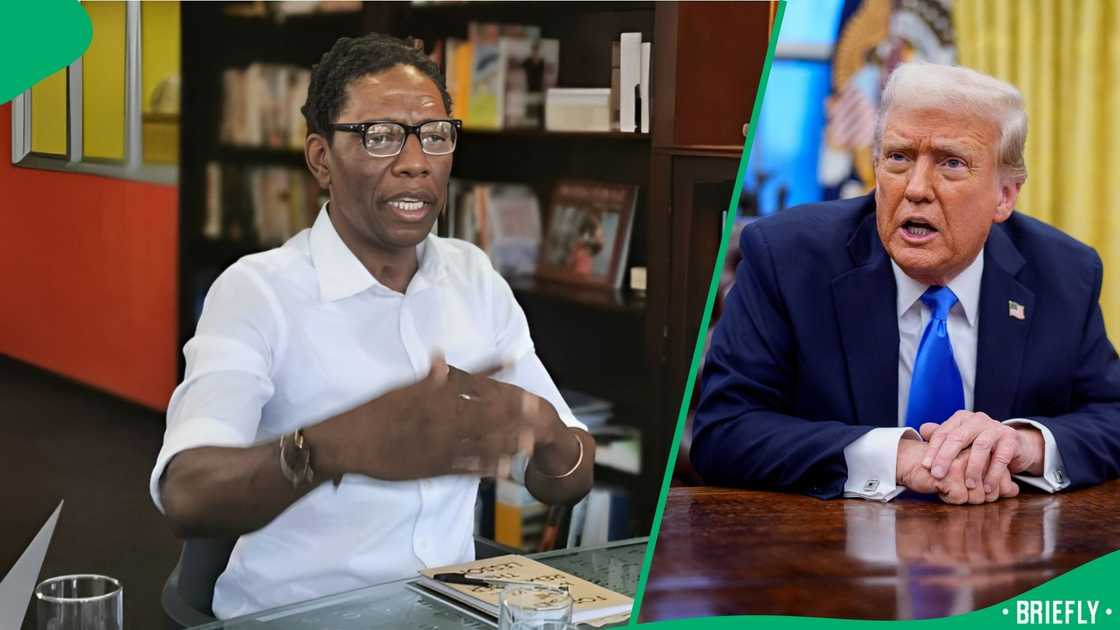
Source: UGC
Tshepiso Mametela is a seasoned journalist at Briefly News. A Head of Current Affairs, Mametela reported live from the presidential inauguration of Cyril Ramaphosa and has written articles on politics, crime, courts, accidents and other topics, including sports, at The Herald and Opera News SA, among others.
JOHANNESBURG — For the past two weeks, the United States and South Africa have been locked in a contentious political impasse, fueled by aid cuts and a flurry of Executive Order signings.
The fracas has drawn widespread debate from various quarters, with many, including politicians, civil groups, experts, and ordinary citizens expressing firm views about the standoff.
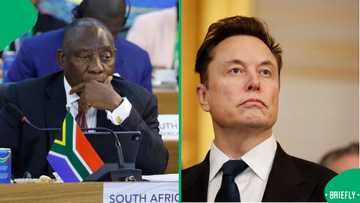
Read also
Starlink deal in jeopardy after President Cyril Ramaphosa accuses Elon Musk of holding racist views
Analysis of contentious US-SA standoff
An independent political analyst, Goodenough Mashego, was no exception as he zeroed in on the noise in an exclusive interview with Briefly News.
PAY ATTENTION: Briefly News is now on YouTube! Check out our interviews on Briefly TV Life now!
Mashego explored the implications of the Expropriation Bill, which President Cyril Ramaphosa signed into law on Thursday, 23 January 2025.
He also discussed the Washington establishment's stance on global expropriation laws, while examining US President Donald Trump's decisions and Elon Musk's perceived influence on the White House.
In discussing Trump's close ally, Musk, Mashego accused him of propaganda, notably for promoting the idea of white genocide.
He chalked up the outlook held by the SA-born tech billionaire, who, alongside another entrepreneur, Vivek Ramaswamy, leads a newly established Department of Government Efficiency (DOGE), to a coloured prism.
"Musk, before buying Twitter (now X), was one of those people who, in subsequent years after settling in America, would tweet about white genocide whenever there was a campaign in South Africa.

Read also
White Afrikaner youth appears to denounce US Embassy protesting group amid 'Die Stem' rendition
"He and others, who over time managed to claw their way up into the MAGA [Make America Great Again] Republican [Party], and the former Tea Party movement, are right-wing supporters," he said.
"These are people who, in South Africa, would have been nationalists or AWB [Afrikaner Weerstandsbewegin] framed. Now that they are in the US, they are aligning themselves to the Republican right.
"As a result, they always see the country through the lens of black-and-white, irrespective of 1994, or Nelson Mandela saying it isn't."
Mashego noted that no law ousting a certain group had been passed after 1994.
He clarified the contents of the Expropriation Bill, which has sparked an enormous debate, and seen over 1,000 white minority Afrikaners demonstrating outside the US Embassy in Tshwane amid a showing of support for Trump.
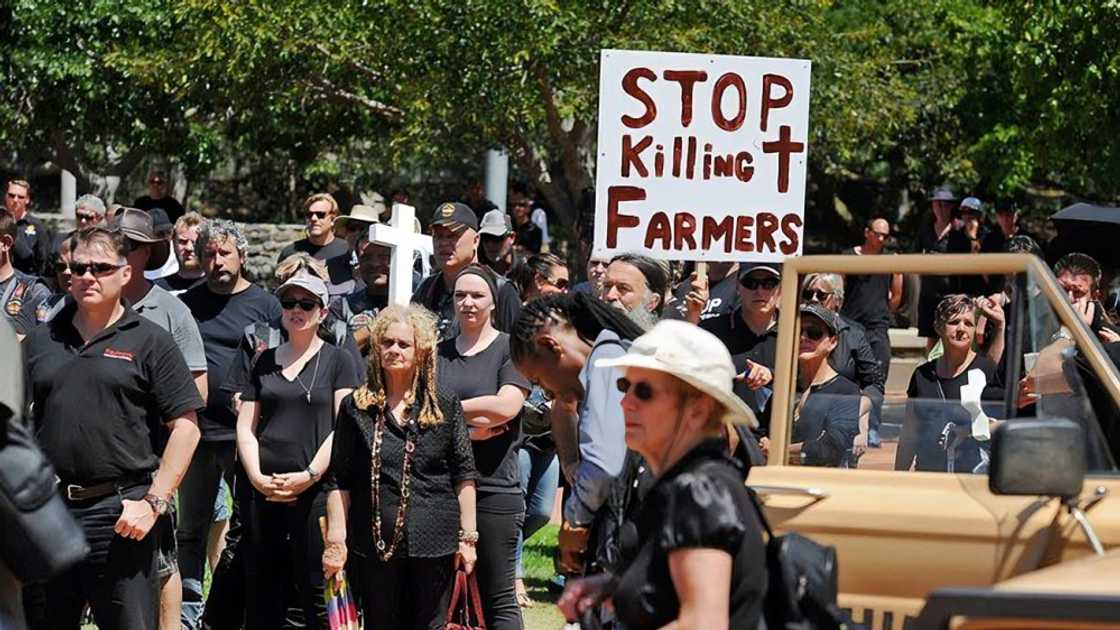
Source: Twitter
While the government can acquire a private individual's property in the public interest, he debunked the view of land expropriation without compensation under the new law.
"The Act, where it says land can be appropriated without compensation for public use, looks at it as land held by the Ingonyama Trust, if the government landholds the Zulu Kingdom [for instance]," said Mashego.
The Ingonyama Trust was founded on the eve of the first democratic elections to ensure control and ownership of the approximately 2.8 million ha of communal land in KwaZulu-Natal.
The Ingonyama, His Majesty the King Misuzulu kaZwelithini, holds the land in Trust for the material benefit and welfare of the tribes and communities.
However, expropriating authorities, such as state departments, ministers, and courts, which have the authority to rule over matters involving expropriation, can expropriate property held by trustees, among others, for a public purpose or in the public interest.
The expropriating authority may only expressly expropriate for a public purpose, including to build a school or hospital. Meanwhile, expropriating for public interest includes equitable land reform for resource access.
Section 25 (8) of the Bill further states that the state may take legislative steps and other measures to redress the results of past racial discrimination.
A literary adjudicator for the Sol Plaatje EU Poetry Award and the South African Literary Awards (SALAs), the independent expert discussed the Natives Land Act of 1913, a South African law which restricted Black land ownership, becoming a cornerstone of the apartheid regime, passed on 19 June 1913.
He said Washington DC's white lobby was met in the context of the former Act, then limiting African land ownership to 7%, while whites held 87%.
This forced the Black majority into designated areas or Bantustans — separate homelands with limited autonomy within an effective system of racial segregation and dispossession.
Impact of 1913 Natives Land Act
The Act further prohibited Blacks from buying or renting land in "white" designated areas, occupying land only as employees of a white master, and restricted the period under which they could live on white-owned farms.
Despite its replacement in 1991, the legacy of the act continues to have far-reaching consequences, with Black South Africans suffering poverty and inequality, impacting the group's ability to secure land and build on it.
"Washington DC's white lobby is met in the context of the 1913 Act. So, when the land question arises, to them, it involves white-only land. In their view, those who own land are white people," said Mashego.
"Since 1994, they have been comfortable with the status quo, whereby land restitution and compensation have not happened. So, the white lobby in Washington has influenced Donald Trump, who is independent, irrational and doesn't go for advice.
"This is more so because any junior staffer could've read through the Act and see it is not targeting white people. It's not an appropriation, but an expropriation Act. There is, therefore, a distinction between the two. The Act in question does not designate land by race."
Mashego said SA was panicking unduly over Trump's threat to withhold funding. However, he explained that the United States Agency for International Development (USAID) programmes aid the country received through the President’s Emergency Plan for AIDS Relief (PEPFAR) was misunderstood.
Previously, Ramaphosa revealed the PEPFAR grant only constituted 17% of SA's HIV/Aids programme, while the country did not receive other US funding.
Mashego added:
"What Trump, Musk and [US State Department Secretary] Marco Rubio fail to understand is that USAID is not charity, it's money that ends up going back to America through procurement of material. [So,] in the bigger scheme of things, the US cannot afford to do that."
ActionSA's Mashaba tears into Musk
In a related story, Briefly News reported that ActionSA President Herman Mashaba added to the South Africa-United States debate.
Specifically, Mashaba gave lip service to Musk after Trump decided to withdraw "all aid" from SA, buoyed by sentiments that the government was confiscating land and, consequently, mistreating certain classes of people.
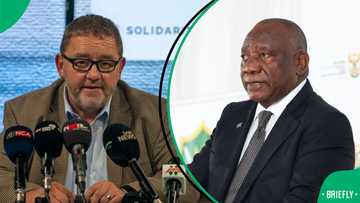
Read also
AfriForum tags Ramaphosa a liar after stressing finding 'SA solutions to SA problems' in SONA reply
Consequently, it set the stage for a giant can of worms, which continues to attract a tumult of responses.
PAY ATTENTION: Follow Briefly News on Twitter and never miss the hottest topics! Find us at @brieflyza!
Source: Briefly News

